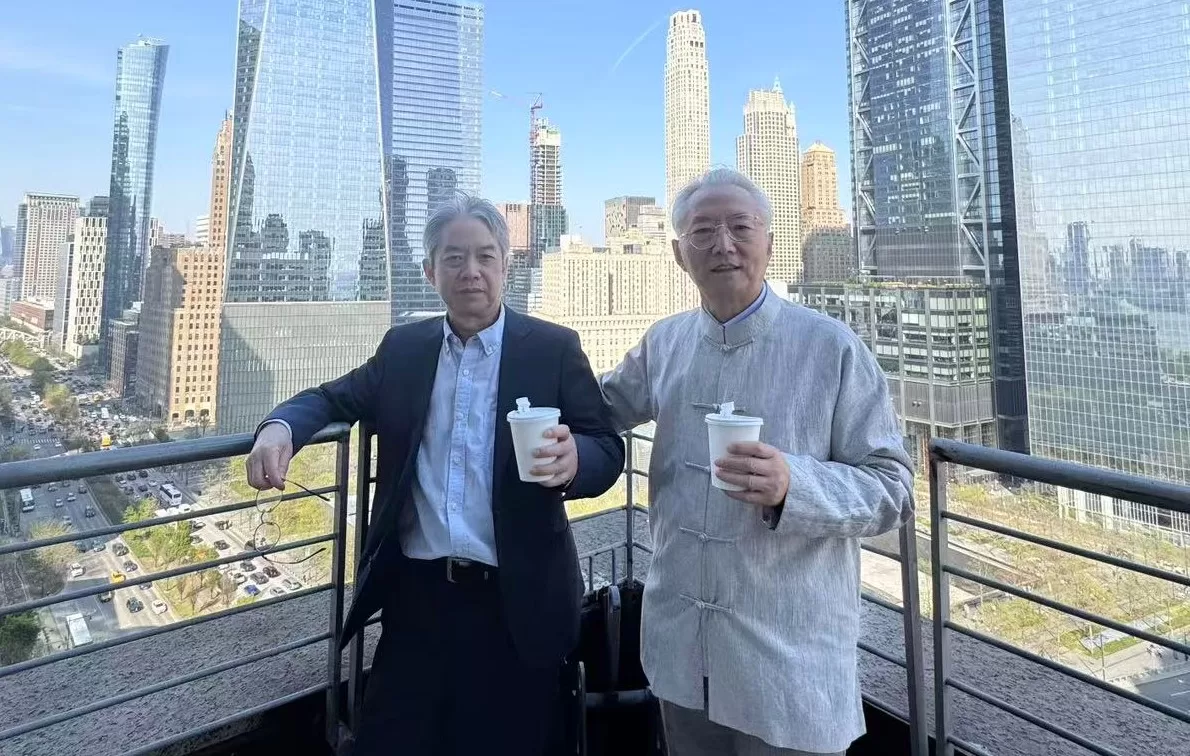
NEW YORK, May 19 (WSH) — In New York City, a vibrant metropolis where East meets West, two brothers from a renowned Traditional Chinese Medicine (TCM) family in China—Dr. TakChio Cheong and Dr. Weichao Zhang—are leading parallel yet interconnected practices.
Operating multiple TCM clinics across the city, the brothers carry the same lineage and share a common mission: to promote Eastern medicine across America through the power of Chinese herbal medicine. As early as the onset of the COVID-19 pandemic, their outstanding contributions were featured in a special report by Xinhua News Agency. Today, they remain active at the forefront of U.S.-China health diplomacy, legislative advocacy, and international education.
Xinhua’s Feature: Real Stories of TCM’s Role in the U.S. Fight Against COVID-19
At the height of the pandemic, the Zhang brothers developed proprietary herbal remedies such as the “Eight Golden Warriors Decoction,” benefiting thousands of patients across New York. Their clinic, Deyutang, became a frontline hub for TCM pandemic relief, serving not only the local Chinese community but also gaining trust from non-Chinese patients. Today, the brothers are advancing research in TCM-based post-COVID recovery, especially in treating pulmonary nodules, with promising clinical outcomes.

Dr. TakChio Cheong treating a patient during the pandemic.
Xinhua News Agency published several feature stories, including “TCM Shines in New York’s Pandemic Response” and “In the Midst of the Pandemic, a TCM Clinic Gains National Attention,” praising the Zhang brothers for “injecting warm Eastern wisdom into America’s healthcare system,” while underscoring TCM’s global public health relevance.

Dr. Weichao Zhang preparing customized herbal remedies for patients during the pandemic.
Dr. TakChio Cheong: A Cancer Specialist Bringing Eastern Healing to the World
Dr. TakChio Cheong serves as President of the International Alliance for TCM Cancer Research & Cure Inc. He leads multiple institutions focused on oncology intervention and herbal medicine research, providing long-term care for critically ill patients. His formula “Da Jin Dan” has shown remarkable efficacy in relieving cancer-related pain, strengthening the immune system, and reducing tumor size.

Dr. TakChio Cheong takes the pulse of Gloria Starr Kins, the oldest journalist accredited at the United Nations.
One of his most cited cases involves Ms. Bian, a brain cancer patient from Jilin, China. After being declared untreatable by several hospitals in China and the U.S., her tumor completely disappeared under Dr. Cheong’s TCM treatment plan—stunning her American oncology specialists. Intrigued, they initiated cross-disciplinary cooperation to explore TCM’s mechanisms.
Dr. Tyvin Andrew Rich, a well-known radiation oncologist in Hampton, Virginia, has since joined the Zhang brothers to co-lead a research project on how TCM supports cancer recovery and long-term health management.

Dr. TakChio Cheong (left) with a patient in the U.S.
Dr. Cheong also co-founded the TCM Cancer Foundation with former CCTV anchor Qian Jing and has lectured at institutions such as Rockefeller University and St. Joseph’s University, voicing China’s medical philosophy at the crossroads of East and West.

Dr. TakChio Cheong (right) lectures on TCM at Rockefeller University. Left: interpreter Ruo Jie Shi.
Dr. Weichao Zhang: A Community Healer Sharing Everyday Wisdom and Cultural Warmth
Dr. Weichao Zhang runs several clinics in areas like Flushing, New York. He specializes in internal medicine, chronic pain, women and children’s health, neurological issues, and medicinal cuisine. Advocating a “lifestyle-based TCM” approach, he uses tai chi, herbal diets, and moxibustion to help communities adopt sustainable health habits.

Dr. Weichao Zhang (left) treating a cervical condition with massage therapy.
Mexican film director Mauricio Val once suffered from a severe ear condition deemed untreatable—until Dr. Zhang ’s acupuncture restored his hearing. Overwhelmed with gratitude, Val publicly praised Dr. Zhang on social media and called him “the man who gave me back the world of sound.”
Dr. Zhang also serves as President of the American Chinese Medicinal Cuisine Alliance and Chairman of the Wudang Tai Chi Foundation. His book The Practical Handbook of Medicinal Cuisine for North America is widely adopted by medical schools. He also founded the New York Herbal Supply Center, offering quality-controlled herbs to TCM clinics across the U.S.
Due to his expertise and influence, many Americans who revere Chinese medicine have formally become his disciples, holding traditional ceremonies to express their respect and dedication to the lineage.

Dr. Weichao Zhang (right) with his brother TakChio Cheong (left) and newly inducted disciples.
A United Front in Congress: Advancing TCM into U.S. Legislative Systems
Beyond clinical work and cultural advocacy, the Zhang brothers actively promote the legal recognition of TCM in the United States. They have participated in public hearings and legislative forums in the U.S. Congress, personally demonstrating acupuncture to senators, representatives, and health officials—giving lawmakers direct experience of its therapeutic effects.

Dr. TakChio Cheong (center) administering acupuncture to staff at the U.S. Capitol.
They emphasize: “The future of TCM in the U.S. depends not only on clinics, but also on entering the legal framework.” Their grassroots advocacy has provided concrete examples to support acupuncture legislation and galvanized the Chinese medical community nationwide.
Brothers with Different Practices, One Vision: Taking TCM Global
Despite operating different clinics and focusing on different specialties, the Zhang brothers maintain a unified vision and actively share resources. They jointly participated in the Hubei Culture & Tourism Promotion in New York, and frequently attend UN health summits and U.S.-China medical forums to elevate the global voice of TCM.
In a recent Xinhua interview, Dr. TakChio Cheong stated: “I want the world to see that Chinese medicine is not just heritage—it is the future.”
Dr. Weichao Zhang added: “A single needle or a spoonful of herbs may seem small, but they can cross cultural and linguistic boundaries.”



